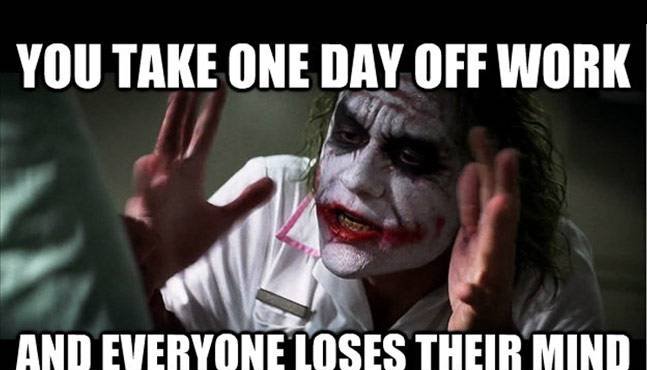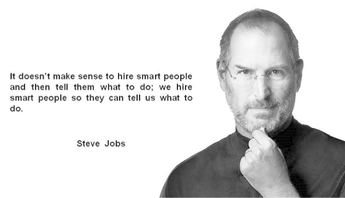 Ok, it’s Monday morning and you have just sat down at your desk. You were busy last week so you did not GET to do your normal calling. But let’s face it, you have not been doing your NORMAL calling for 7 weeks now. Something has come up every week to get in the way of your cold calls. One week your dog was sick (odd, because you don’t have a dog) one week you had the sales conference in Las Vegas (you had a slow start every morning in Las Vegas…must be the dry air and your sinuses) and remember that week when you had to go to product training (Ok it lasted only 2 hours, but you had to think about the repercussions of the information you had absorbed.) These are rookie excuses that sales managers have heard all too often. These rookie excuses will get you fired for lack of initiative if nothing else. They are trite and candidly lack any imagination. Our list of 8 solid reasons for not making calls should last you at least 3 months. So let’s get started, and remember, they will work best when practiced often and delivered with a sense of remorse.
Now, at some point in time you are going to have to get in front of customers. And, as we have discussed in our past posts, there are many different ways to do that if you don’t like to cold call. You can work phones with your friends, you can work conventions, you can do direct mail, or you can work your LinkedIn network. All of these are good. But, if you want the most innovative and perhaps efficient method of getting in front of decision makers you have to give Axcelora a try. Leveraging it’s more than 1,100 years of retail and restaurant experience, and contacts with more than 4,400 retail/restaurant decision makers Axcelora is attempting to make cold calling obsolete. As one client said “You have put us in front of more qualified prospects in two months than we were able to do for ourselves in a year and a half.”
0 Comments
 I remember one of the first sales training sessions I went to at Dale Carnegie in 1973. Most of the people in this sales training class were not retailers, so the leader of the class was concentrating on them. He brought out a Yellow Pages phone book (for you younger people ask your parents what the Yellow Pages were, and for that matter what a Phone Book was) and told us that this was a suspect list and that professional sales people were able to take a suspect list and turn it into a prospect list. That visualization stuck with me for more than 25 years until I got into the B2B sales business. I remember sitting down in front of a database that I had with the name, address, and phone number of every significant retailer in the US. There were thousands of them in the database but this was my suspect list. Just like the phone book that the Dale Carnegie teacher had shown me 25 years earlier…and just as useful. I had to develop a plan to take this list and make it manageable, otherwise I would be overwhelmed. And an overwhelmed sales person faces the prospect of inertia. So over the next several years I developed several key steps I took whenever we looked at a group of suspects.
Finally, sit down with your sales manager and get buy in of your plan. Listen and be open to suggestions you may be given. But, don’t be afraid to defend the plan you have developed. If you have been thoughtful about your plan, share it with the person hired to listen to you. When you both agree to the plan, get to work. Along the way you should analyze your results and correct your course if necessary. If you are having a difficult time getting into a prospect you think is a must see, look for different methods to break the door down. An interesting new company in that field is Axcelora (www.axcelora.com). They use individual personal relationships to make personal appointments. There are also companies that use professional telemarketers like Sales Roads (www.salesroads.com ) and I even found one that used actors. Leverage your LinkedIn network. Take the time to learn the best practices of LinkedIn, it will be well worth your while. But most importantly, create the plan, write the plan down on paper, and post the results of the plan to yourself and your leadership team. Oh yeah, enjoy the success.  We have all worked for people that we like more than others. But many of us have also worked for people that are simply just short sighted. People that cannot see the forest for the trees, that walk over dollars to save pennies and 20 other clichés’ that I won’t bother to mention. In the world of sales management, these shortsighted views can often get in the way of running a successful organization. I thought I would write them down and look for your ideas on how you have fixed them within your companies. 1. Only travel to visit a potential customer when you are certain you are going to make a sale. This requirement is normally only imposed onto a sales team by a sales manager that has never sold and never traveled. It is like saying a retail sales person should only go and speak to a customer that wants to buy something. How do you know? a. I realize that you should qualify a customer before you go and visit with them in person, but in the world we live in today, if the customer is willing to give you some of their time (and they are the right person), they have an interest. b. Shortsighted Sales Managers do not realize that many good things come out of making presentations. i. You get to practice your presentation ii. You get to learn about the customer iii. The customer gets to learn more about your company iv. You get to encourage them to dream about what your product and service can do for their company. v. You get to find out who they may know that could use your services So there are many advantages of going on an appointment but poor sales managers tend to miss them. 2. You can Manage your way to a successful sales career. I cannot tell you the prevalence of this trait in Shortsighted Sales Managers.They are so concerned about process over product it makes your head spin. I can certainly understand the importance of recording all interactions with the customer. I also understand how poorly sales people do in this area; it is right brain vs. left brain. It is actually a good way to create effective habits for new sales people. But a shortsighted sales manager seems to treat everyone equally, not giving latitude to the winners and more direction to the people struggling for success. Leaders lead and Managers should not be in sales. 3. Thinking that budgets and goals are the same thing. I have never understood paying an employee on a budget, especially a budget set by someone other than the employee. For the first 25 years of my working career I worked for Tandy Corporation/Radio Shack. We never had a budget in the entire time I worked for Radio Shack. We certainly had lots of goals for the company. We had Leaders Club goals, we had the goal for our first Billion Dollar year. We tracked our sales for computers until we got to the first 100,000 (just like McDonalds). But, no one got paid on these goals. We got paid on how much money we made. And that is how all sales people should be paid. Shortsighted Sales Managers use budgets to punish some people and reward others. Budgets that are set by an accountant (no offense to accountants) are the scariest thing to put into a sales organization. Budgets are used by sales organizations that are afraid they are going to pay their sales team too much money. NEVER worry about paying your sales people too much, worry about them not earning enough. 4. Shortsighted Sales Managers never want to face the customer.Shortsighted Sales Managers think their job is to manage the sales force, not to lead the sales force. They only want to go out on the “sure thing” sales calls and then blame the rep if the sale does not happen. Great sales leaders always want to be in front of the toughest sales opportunities. They also take public responsibility for all failures and give praise to their team for all success. 5. Finally, Shortsighted Sales Managers pick favorites. It is so obvious in some organizations that a Sales Manager has picked a favorite. Some times that favorite is because they are the best sales person in the organization, but even then it is shortsighted. While no one can be even handed all of the time, it is important to not appear to have a favorite. It makes all of the disciplines you have tried to put into the organization seem worthless. Why try to get ahead when the boss is going to take care of Mr./Ms. X no matter what happens. One of the best sales managers I ever met always had a favorite. It was the person that had just closed the latest sale. And that favoritism lasted just until the next sale was made. Shortsightedness keeps you from seeing the big picture. It makes you focus on the wrong thing. By letting these wrong ideas get into your sales organizations you are seeding a crop of failure. It may not happen today, but unless you focus on the big picture you are on the wrong road. Steve Jobs had the right idea. Hire smart people and listen to them. Often times 1 person plus 1 more person can yield you the ideas of many people. You might want to get onto a great sales organization by looking at Axcelora and the unique service we provide to the B2B retail/restaurant world. We are constantly looking for people that want to join our group and grow with us. |
AuthorRich Hollander is a retail expert with over 40 years in the industry. Archives
September 2021
Categories |
© Copyright 2016 Axcelora, LLC.
All rights reserved.
All rights reserved.

 RSS Feed
RSS Feed